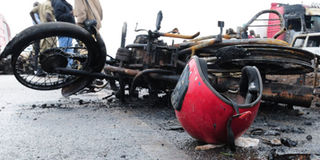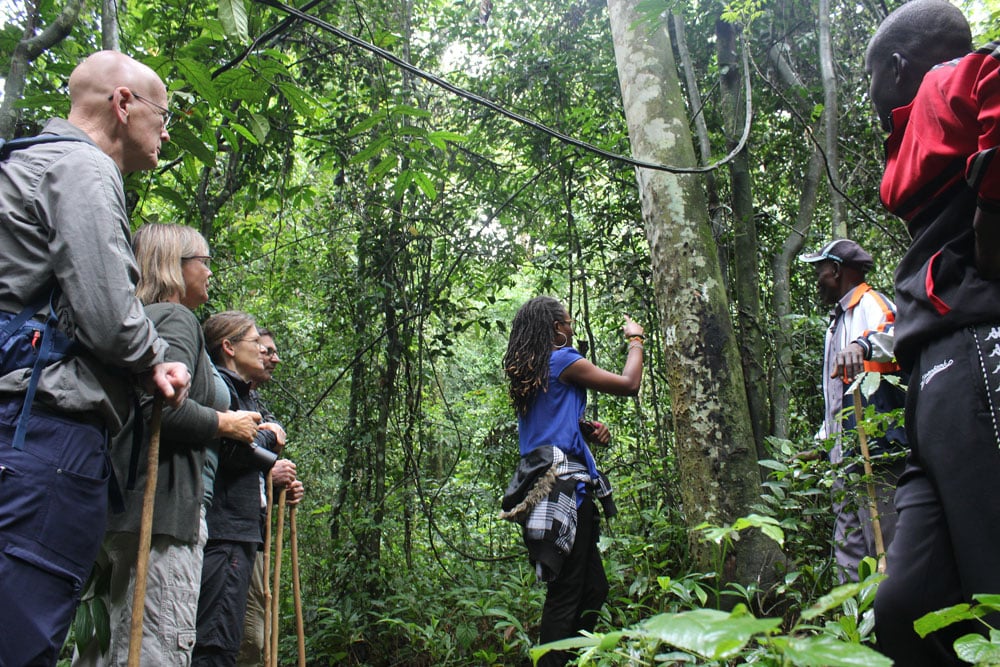Fuel Tanker Deaths: Was it greed, poverty or both?

A cyclist’s crash helmet lies at the scene of the inferno where over 30 people died as they siphoned fuel. Photo by Joseph Kiggundu.
What you need to know:
In the gory scenes of the fuel tanker disaster, leaders have a job cut out to sensitise the masses on value systems
In a country where road carnage is common, deaths in traffic or other accidents is no big news unless many lives are lost. A Ugandan editor is likely to ignore or give less prominence to an accident story where the number of the dead is not in double digits, unless the victims are foreign nationals.
It is an indication of how we, as a society, value life or perhaps accurately, do not. After all, if you survive being shot on the streets by unaccountable security operatives subduing an opposition protest, a hoodlum is likely to cruelly hit you dead with an iron bar; and or, a lack of medicines, diagnostic equipment and health workers mean many patients especially at public hospitals die when they should not.
Because nearly 98 per cent of Ugandans are religious, death is simply explained as God’s call.
That way, no one takes personal or official responsibility --- and not much is subjected to scrutiny in ways to improve behaviour or work ethic because the Bible says no one knows the time they will die and how.
Biblical narrative
Some relatives of, and witnesses to, victims of the Namungoona accident yesterday employed this familiar biblical narrative to explain the fate of at least 33 people who burned to death, most of them caught in a fireball from an exploding fuel tanker from which they congregated to siphon fuel.
That petrol is highly flammable is common knowledge, and the country has a disturbing history of gasoline-related disasters. At least 204 people perished in incidents involving fuel tankers between 2001 and 2007, according to police records.
And the tales about the fatal journeys strike a semblance: A fuel truck overturns or crashes, residents quickly gather to harvest the free fuel and fire of unknown cause sparks a blast, killing as many.
In the relative quiet of the night, residents of Namungoona, a Kampala suburb, are familiar with the croaks of frogs in Lubigi marshland and occasional trumpets from engines of vehicles firing on the Northern Bypass.
On Saturday night, it was a macabre storyline. Three witnesses spoke of a fuel tanker taking a halt on the Northern Bypass, close to the Namungoona round-about.
It was twilight and some motorcycle riders soon discovered that they could tap fuel from the tanker undisturbed, according to James Muyingo, himself a boda man at the nearby Lubigi Northern Bypass Stage.
Seven of his colleagues, he said, died in the inferno. “The boda boda were coming with jerry cans to take fuel; others used empty mineral water bottles, helmets and polythene bags,” he said. All seemed fine.
‘Bonanza’
Some residents, among them a pregnant woman vending foodstuff by the roadside, joined with basins, saucepans and whatever utensil to scoop fuel. It was a bonanza.
Then a driver of a speeding Noah vehicle heading out of the city hit the stationary fuel tanker in the rear, breaking one of the fuel tank valves. As a result, the petrol began gushing.
This, according to Ms Nalule, better known by the pet name Mama Isaac, whose house is roughly 150 metres from the accident scene, excited the motorcyclists. Many more joined. They honked the motorbike horns and some rode with the bike stud screeching and sparking on the bitumen surface, something remotely believed to have likely caused the fire.
Then within 20 minutes or so, something ruinous happened: A horrendous blast followed by a fireball in a thick plume of smoke and a cacophony of distress calls by screaming adults, some fleeing with blazing clothes.
Residents knew the tanker had burst, and taken in its din and glow lives of men and women who aimed to profiteer from freebies.
“I don’t know where this poverty is taking us,” said a police officer, one of the first to arrive at the scene.
A litter of half-burned shoes and helmet plus barbequed body parts were a relic of the tragedy indescribable in words.
If the din disturbed the sleep of residents, what they saw afterward was certain to traumatise. The sight of charred bodies floating in the side-drain flooded with a toxic mix of gasoline, muck water and fetid garbage was repugnant.
The skin of the dead and burn survivors peeled off with ease, making lifting of the victims out of the trenches a dicey and revolting affair. But some volunteers plucked off shirts and dragged the bodies onto the road with bare hand.
Most police officers feared to indulge in the demanding rescue and recovery efforts inside a swamp alongside a highway without street lights. Onlookers helped light the scene with torches on mobile telephone handsets.
Whereas the urge to get free fuel could have been birthed by poverty-induced desperation, as enunciated by a law enforcement officer, some witnesses faulted greed and carelessness of the victims.
Somali owners of the ill-fated tanker arrived yesterday afternoon with another truck to drain the remaining fuel in the damaged one, whose driver survived.
“We are still handling a critical situation, and cannot talk about this tragedy,” one who declined to identify himself said. The air was saturated with smell of burnt grass, fuel and filth, making for a suffocating breathe.
Quick money
Ms Lillian Nabuja, a nearby resident, said one of the excited boda riders brought to her home fuel in a jerrycan, which he sold to a visitor, and returned immediately to scoop more. “They were making quick money, I think,” she said. The man never made it back.
Mr Muyingo, who spoke about his dead colleagues with gloom, told this newspaper he kept away because he was aware fuel siphoning is a dangerous adventure. “For me I feared, but I’m lucky to be alive,” he said, staring at nothing particular in the distant.
As families take in the loss of their loved ones, or deplete their cash reserves to save the lives of the survivors, the country will leap to the next to-be tragedy and only refer to Namungoona incident for as much official statistics.
And soon, it will be manifest whether Ugandans – some of who steal from accident victims - have learned a lesson or forgotten everything about playing with fuel.




